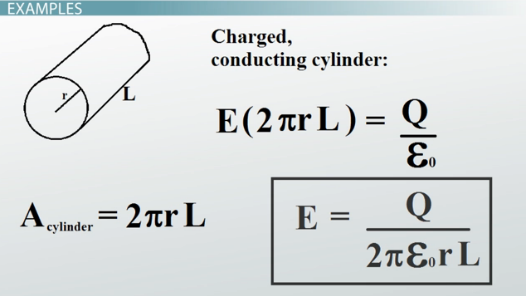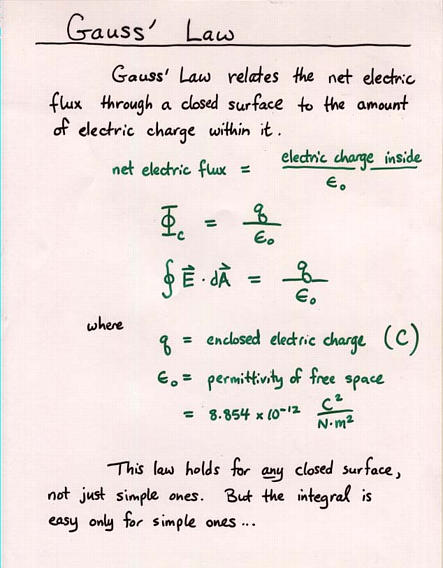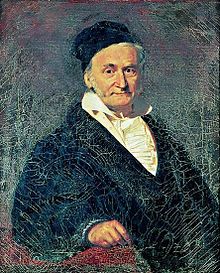Gauss's Law
Claimed by Kel Johnson
One of Maxwell's Equations, formulated by Carl Friedrich Gauss. Gauss's Law is useful in determining the relationship between electric charge and the surrounding field caused by the charge.
The Main Idea
The idea of Gauss's Law is that the electric flux out of a closed surface is equivalent to the charge enclosed, divided by the permittivity. There is a near identical law to this law, known as Gauss's law for Magnetism. The variation found is that magnetic fields are used instead of electric fields in the calculations. Also, Gauss's Law for Gravity is very similar as well. To state it again, the electric flux passing through a closed surface is the same as the charge enclosed, divided by permittivity of the surface. This implies that the electric flux is proportional to the total charge enclosed. Any closed surface can be have Gauss's Law applied to it. For symmetrically shaped objects, Gauss's Law greatly simplifies calculation of electric field enclosed by surface.
A Mathematical Model
A very helpful and clear summary of this Law can be found in the diagram below. As can be seen on the left side of this diagram, change in flux equals electric field multiplied by change in area.
To more clearly state it, the formula for this Law is the electric flux equals the total charge contained by a closed surface, divided by the permittivity (epsilon zero).
Examples
In order to apply Gauss's Law, it is important to be certain you are working with a closed surface, then set electric flux equal to the internal field divided by the permittivity (epsilon not). An example of this Law being applied can be found below.
Below is a further example of Gauss's Law with explanation.
Connectedness
Gauss's Law, as well as the other Maxwell Equations form a basis for electrodynamics. They are the fundamental core of this field of study. Magnetostatics study is also closely related to Gauss' Law, but in particular Gauss's Law of Magnetism, which is very similar to Gauss's Law relating to electric fields.
History
Carl Friedrich Gauss was a German Mathematician and Physicist who contributed notably to a wide variety of fields regarding mathematical and scientific study. He has been referred to as the "greatest mathematician since antiquity" and the "foremost of mathematicians". He is considered one of the most impactful and influential contributors to the fields of Mathematics and Physics in history.
See also
Gauss's Law is tied in closely with the other of Maxwell's equations that can be found here in the Physics Book.
http://physicsbook.gatech.edu/Gauss%27s_Flux_Theorem
http://physicsbook.gatech.edu/Faraday%27s_Law
http://physicsbook.gatech.edu/Magnetic_Flux
http://physicsbook.gatech.edu/Ampere%27s_Law
External links
http://physics.info/law-gauss/
https://en.wikipedia.org/wiki/Gauss%27s_law
https://en.wikipedia.org/wiki/Carl_Friedrich_Gauss
References
http://hyperphysics.phy-astr.gsu.edu/hbase/electric/gaulaw.html
spiff.rit.edu
study.com



